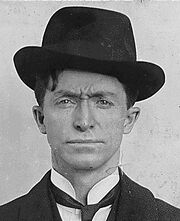
Al Jennings
Alphonso J. "Al" Jennings (November 25, 1863 - December 26, 1961) American Prosecuting Attorney, Train Robber, Actor and Techical Advisor. Jennings settled in El Reno, Oklahoma Territory, and served as Canadian County, Oklahoma prosecuting attorney from 1892 until 1894. In 1895 he joined his brothers, Ed and John, in a law practice at Woodward. In October of that year Ed Jennings was killed, and John Jennings wounded, in a shootout with rival attorney Temple Lea Houston.
Jennings left Woodward following Houston's acquittal in 1896 and wandered before gaining employment as a ranch hand in the Creek Nation. While working near present Bixby in Creek County, Jennings joined an outlaw band. During the summer and fall of 1897 the desperados, often referred to as the "Jennings Gang," robbed trains, general stores, and a post office, with little monetary success. Jennings was wounded by law officers on November 30, 1897, and captured one week later on Carr Creek near Onapa in McIntosh County, Oklahoma. In 1899 Jennings was sentenced to life in prison, but, due to the legal efforts of his brother John, his sentence was reduced to five years. He was freed on technicalities in 1902 and received a presidential pardon in 1904 by President Theodore Roosevelt. Then in 1906, he married Maude Jennings.
He re-created one of his bank robberies in the 1908 film The Bank Robbery. Heck Thomas assembled a posse, chased and captured the bank robbers, while the one-reel movie was directed by Bill Tilghman, James Bennie Kent was the cinema-photographer, and it was produced by the Oklahoma Natural Mutoscene Company. The film was shot in Cache, Oklahoma and at the Wichita Mountains Wildlife Refuge, with Quanah Parker having a bit part. A bystander thought that the bank was really being robbed and jumped out a window to run for the police. Jennings moved to Oklahoma City in 1911 and became active in politics. In 1912 he won the Democratic nomination for Oklahoma County attorney, but he lost the general election. In 1914 he made an unsuccessful run for the office of governor of Oklahoma. Enjoying the popularity of his starring role in the film adaptation of his 1913 biography, Beating Back, Jennings campaigned openly about his past and won votes with his honesty. One of six democratic candidates, he finished third in the primary behind James B. A. Robertson and Robert L. Williams. Jennings wrote another book, Through the Shadows With O. Henry, which was published in 1921 by NY Burt. It details his friendship with the short story writer, then known only as William Sydney Porter, from a few years before they were sent to the Ohio State Penitentiary (on charges arising from separate incidents), until sometime after their release from prison within a few years of each other, and a subsequent meeting in New York. Retiring from law and politics, Jennings moved to California and worked in the motion picture industry making Westerns. A movie bio of him was made in 1951, Al Jennings of Oklahoma, with Dan Duryea in the title role. He died in Tarzana, California, on December 26, 1961. He is interred in the Oakwood Memorial Park Cemetery in Chatsworth, California.